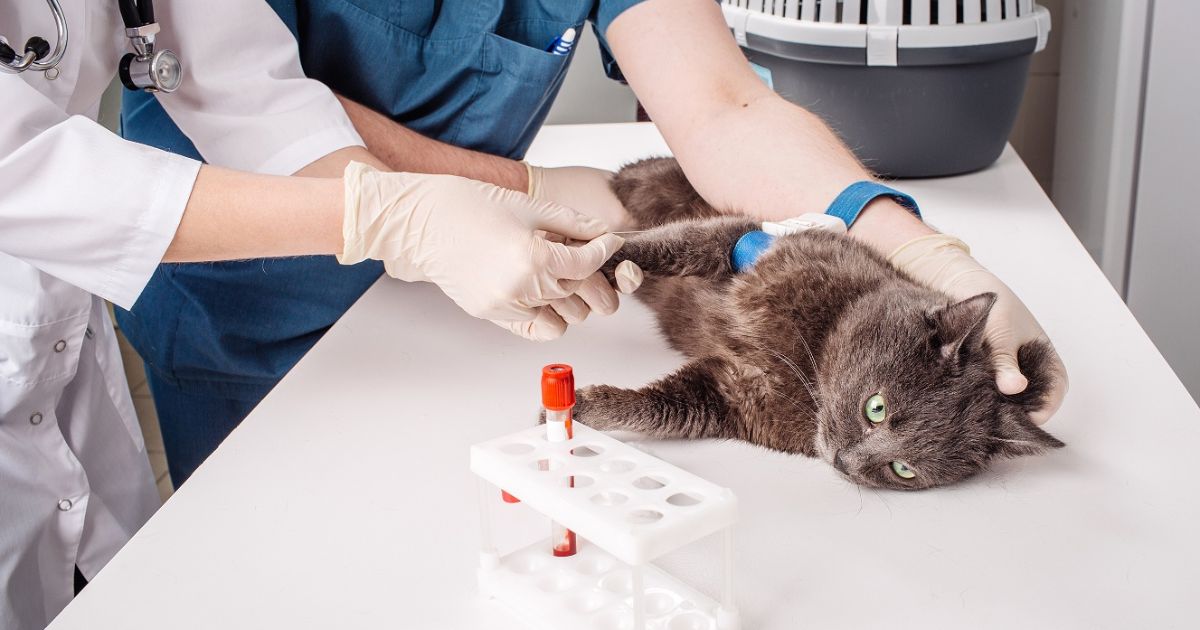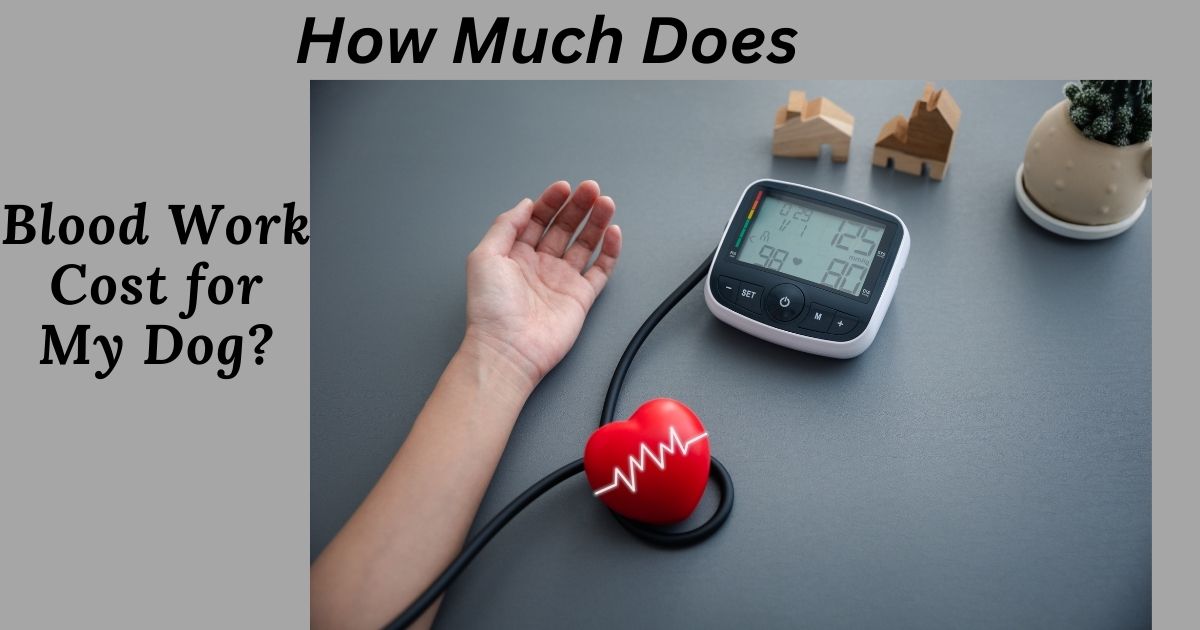Pet owners often find themselves contemplating the cost of their furry friend’s healthcare, and blood work is no exception. Understanding the financial aspect of veterinary care is crucial for responsible pet ownership. In this comprehensive guide, we’ll delve into the question, “How much does blood work cost for my dog?” We’ll explore various factors affecting the expenses, different types of lab work, the process of obtaining blood from dogs, interpreting the results, and ways to manage costs. Whether you’re a seasoned pet parent or a novice, this guide aims to empower you with the knowledge needed to make informed decisions about your dog’s healthcare.
Table of Contents
ToggleHow much does Blood Work Cost for my Dog? what you need to know
Your furry companion’s health is paramount, and blood work plays a pivotal role in ensuring their well-being. In this section, we’ll provide a comprehensive guide on the various aspects associated with the cost of blood work for dogs.
Topic 1: Different types of lab work for your dog and estimated costs
Understanding the scope of lab work is crucial for comprehending the associated costs. Different tests serve diverse purposes, each with its own price tag. Fecal tests, heartworm tests, urine tests, complete blood counts (CBC), allergy tests, and preventative care tests are common diagnostic tools. Fecal tests primarily check for parasites and digestive issues, ranging from $25 to $45. Heartworm tests, crucial for preventing heartworm disease, can cost between $45 and $50. Urine tests, evaluating kidney function and urinary tract health, typically range from $35 to $45.
Estimated Costs of Different Types of Lab Work for Dogs
| Lab Test | Estimated Cost Range |
|---|---|
| Fecal Test | $25 – $45 |
| Heartworm Test | $45 – $50 |
| Urine Test | $35 – $45 |
| Complete Blood Count | $50 – $100 |
| Allergy Test | $150 – $300 |
| Preventative Care Tests | Varies |
Complete Blood Counts (CBC) assess overall health and can cost between $50 and $100. Allergy tests, vital for identifying allergens affecting your dog, may range from $150 to $300. Preventative care tests, which often include a combination of different diagnostics, can vary in cost.
Topic 2: How is blood taken from a dog?
Understanding the process of obtaining blood from a dog can alleviate concerns about the procedure. Veterinarians typically draw blood from a vein in your dog’s front leg. The area is cleaned, and a needle is carefully inserted to collect the necessary samples. While the process might cause temporary discomfort, it is usually swift and well-tolerated by dogs. The collected blood is then sent to a laboratory for analysis, and the results play a crucial role in diagnosing potential health issues.
Topic 3: Understanding your dog’s results from their lab or blood work
Interpreting the results of your dog’s lab work requires a basic understanding of the values measured. Reference ranges for various parameters, such as red and white blood cell counts, liver and kidney function, and cholesterol levels, provide insights into your dog’s health. Your veterinarian will explain the results, highlighting any abnormalities or areas of concern. Regular monitoring of these values is essential for tracking your dog’s health over time.
Topic 4: Do all dogs need blood work?
Not all dogs require routine blood work, but specific circumstances may necessitate it. Puppies often undergo blood tests as part of their initial wellness exams, ensuring they start life on a healthy note. Senior dogs may need more frequent blood work to monitor age-related issues. Dogs with chronic illnesses, unexplained symptoms, or those undergoing certain treatments may also require regular blood tests. Your veterinarian will guide you on the appropriate schedule based on your dog’s individual health needs.
How much does blood work cost for my dog without insurance

Pet insurance can significantly ease the financial burden of veterinary care, including blood work. However, for those without insurance, understanding the potential costs is crucial. In this section, we’ll explore the expenses and ways to manage them without insurance.
Vets4Pets Blood Test Cost UK
In the UK, veterinary costs, including blood tests, can vary. Vets4Pets, a popular veterinary service, provides comprehensive blood testing for dogs. The cost depends on the specific tests required, ranging from routine screenings to more specialized diagnostics. On average, you can expect to pay between £50 and £150 for blood work at Vets4Pets.
Average Costs of Blood Work at Vets4Pets
| Type of Blood Test | Average Cost (GBP) |
|---|---|
| Routine Screening | £50 – £80 |
| Specialized Diagnostics | £80 – £150 |
Routine screenings, which include basic blood parameters, generally fall within the £50 to £80 range. Specialized diagnostics, covering more in-depth analyses, may cost between £80 and £150.
How much does blood work cost for my dog NHS
For pet owners in the UK relying on the National Health Service (NHS), understanding the role of public veterinary services and their associated costs is crucial.
The NHS primarily focuses on human healthcare, and while there are public veterinary services, they may not cover comprehensive blood work for dogs. Pet owners relying on NHS services for their dogs’ healthcare may need to explore private veterinary clinics or specialized services like Vets4Pets, where costs may apply.
Dog blood test cost Vets for Pets

Vets for Pets is a well-known veterinary service, and understanding their pricing structure for dog blood tests is essential for budget-conscious pet owners.
Vets for Pets offers a range of blood tests catering to different needs. Routine screenings generally cost between £50 and £80, while more specialized diagnostics may range from £80 to £150. The specific requirements of your dog’s health condition will determine the appropriate tests, and your veterinarian at Vets for Pets will guide you through the process and associated costs.
Pets at Home Blood Test Cost
Pets at Home, another popular option for pet owners in the UK, provides veterinary services, including blood tests. Let’s explore the potential costs associated with blood work at Pets at Home.
Pets at Home offers comprehensive blood testing for dogs, covering routine screenings and specialized diagnostics. On average, you can expect to pay between £50 and £150 for blood work at Pets at Home. The specific tests needed for your dog will influence the overall cost, and the veterinarians at Pets at Home will guide you through the process.
Estimated Costs of Blood Work at Different Veterinary Services in the UK
| Veterinary Service | Average Cost Range (GBP) |
|---|---|
| Vets4Pets | £50 – £150 |
| NHS (Limited Coverage) | Costs may apply |
| Vets for Pets | £50 – £150 |
| Pets at Home | £50 – £150 |
Why are dog blood tests so expensive
Understanding the factors that contribute to the seemingly high costs of dog blood tests is crucial for pet owners. In this section, we’ll explore the reasons behind the expense of these diagnostic procedures.
Reasons Behind the Cost of Dog Blood Tests
- Specialized Equipment: The equipment used for blood tests in veterinary clinics is often highly specialized and requires regular maintenance. This ensures accurate and reliable results, but it also contributes to the overall expenses.
- Skilled Personnel: Conducting blood tests on dogs requires skilled and trained veterinary professionals. Their expertise ensures the proper collection of samples, accurate analysis, and interpretation of results, adding to the overall cost.
- Laboratory Analysis: Blood samples collected from dogs are sent to laboratories for analysis. These facilities use advanced technology to provide detailed insights into your pet’s health. The costs associated with these external services contribute to the overall expense.
- Quality Control Measures: To maintain the quality and accuracy of results, veterinary clinics adhere to stringent quality control measures. This includes regular calibration of equipment, ensuring that the results are reliable for accurate diagnosis.
- Specialized Tests: Some blood tests for dogs involve more specialized procedures and analysis, such as allergy tests or genetic testing. These tests often require more time and resources, contributing to higher costs.
Understanding these factors helps pet owners appreciate the level of care and precision involved in dog blood tests. While the expenses may seem high, they are a reflection of the quality and reliability of the healthcare provided to your furry friend.
Dog Full Blood Test Cost UK
For pet owners seeking a comprehensive evaluation of their dog’s health, a full blood test may be recommended. Let’s explore the average costs associated with a complete blood test for dogs in the UK.
Full blood tests in the UK, which encompass a thorough examination of various blood parameters, can range from £80 to £150. This comprehensive analysis provides a detailed overview of your dog’s health, including red and white blood cell counts, organ function, and potential abnormalities. The specific requirements of the test and the veterinary clinic you choose will influence the overall cost.
Average Cost of Full Blood Tests for Dogs in the UK
| Type of Blood Test | Average Cost Range (GBP) |
|---|---|
| Full Blood Test | £80 – £150 |
Investing in a full blood test can offer a comprehensive understanding of your dog’s health, aiding in the early detection of potential issues and facilitating timely intervention.
Cat Blood Test Cost Vets4Pets

While the focus of this guide is primarily on dogs, it’s essential to briefly touch on the costs of blood tests for our feline friends. For pet owners with cats, Vets4Pets is a notable veterinary service offering comprehensive blood testing.
At Vets4Pets, cat blood tests, similar to those for dogs, can vary based on the specific tests required. Routine screenings typically range from £50 to £80, while more specialized diagnostics may cost between £80 and £150. The specific health needs of your cat will determine the appropriate tests, and the veterinarians at Vets4Pets can guide you through the process.
Ways to Lower the Cost of Your Dog’s Blood Tests
Managing the costs of your dog’s healthcare is a valid concern for many pet owners. In this section, we’ll explore practical strategies to help lower the overall expenses associated with dog blood tests.
Strategies to Lower the Cost of Dog Blood Tests
- Pet Insurance: Consider investing in pet insurance to help cover the costs of veterinary care, including blood tests. Different insurance plans offer varying levels of coverage, so choose one that suits your budget and meets your pet’s healthcare needs.
- Wellness Plans: Some veterinary clinics offer wellness plans that include routine blood tests as part of a package. These plans often provide cost savings compared to paying for individual tests separately.
- Regular Veterinary Check-ups: Schedule regular check-ups for your dog to monitor their overall health. Detecting potential issues early may reduce the need for extensive and costly diagnostic tests.
- Discuss Costs with Your Veterinarian: Open communication with your veterinarian is essential. Discuss your budget constraints, and they may be able to recommend alternative tests or payment plans that align with your financial situation.
- Comparative Shopping: Veterinary services can vary in cost. Consider obtaining quotes from different clinics for the same set of tests to identify more budget-friendly options.
By implementing these strategies, you can actively manage and reduce the financial impact of your dog’s healthcare, ensuring that you provide them with the best care within your means.
Get the Blood Test If Your Dog Needs It
The decision to proceed with a blood test for your dog is ultimately based on their specific health needs. In this section, we’ll explore the importance of getting the test if your dog requires it.
Signs Your Dog May Need a Blood Test
- Unexplained Symptoms: If your dog exhibits unexplained symptoms such as lethargy, weight loss, changes in appetite, or unusual behavior, a blood test can help identify underlying health issues.
- Age-Related Health Monitoring: Senior dogs, like humans, may develop age-related health issues. Regular blood tests can aid in monitoring organ function and identifying potential concerns early.
- Chronic Conditions: Dogs with chronic conditions, such as diabetes or kidney disease, may require regular blood tests to manage and monitor their conditions effectively.
- Preventative Care: Some blood tests, like heartworm tests, are part of preventative care. Regular screenings help ensure early detection and treatment if needed.
Understanding the signs that indicate the need for a blood test allows you to make informed decisions about your dog’s healthcare. Trust your veterinarian’s guidance and prioritize your dog’s well-being.
Fun and Healthy Peanut Butter Dog Treat Recipe
While we’ve delved into the serious aspects of dog healthcare, it’s essential to lighten the mood with a fun and healthy treat recipe for your furry friend.
Ingredients for Peanut Butter Dog Treats
- 1 cup whole wheat flour
- 1/2 cup rolled oats
- 1/4 cup dry milk
- 1/4 cup cornmeal
- 1/2 cup peanut butter (unsalted)
- 1/2 cup water
- 1 beaten egg
Step-by-Step Instructions
| Step | Instruction |
|---|---|
| 1 | Preheat the oven to 350°F (175°C). |
| 2 | In a large bowl, combine flour, oats, dry milk, and cornmeal. |
| 3 | In a separate bowl, mix peanut butter, water, and beaten egg. |
| 4 | Gradually add wet ingredients to dry ingredients, stirring until well combined. |
| 5 | Roll out the dough and use cookie cutters to create fun shapes. |
| 6 | Place the treats on a greased baking sheet. |
| 7 | Bake for 20-25 minutes or until golden brown. |
| 8 | Allow the treats to cool completely before serving to your furry friend. |
This simple recipe allows you to treat your dog to a delicious snack while ensuring they receive a bit of extra love
FAQ’s
What is the average cost of a blood test for a dog?
The average cost varies widely, typically ranging from $50 to $200, depending on the type of test and location.
What is a full blood test in dogs?
A full blood test in dogs includes complete blood count (CBC) and blood chemistry panel to assess overall health and organ function.
Why do vets charge so much for blood tests?
Vets charge for blood tests to cover costs of equipment, expertise, and analysis required for accurate results.
Is blood work necessary for dogs?
Blood work is often necessary to diagnose health issues, monitor chronic conditions, or as a preventive measure in routine check-ups.
Can I test my dog’s blood at home?
While some basic tests can be done at home, most blood tests require professional equipment and expertise for accurate results.
Conclusion
In conclusion, understanding the cost of blood work for your dog is an essential aspect of responsible pet ownership. From the different types of lab work to the process of obtaining blood, interpreting results, and managing expenses, this guide aimed to provide a comprehensive overview.
Ensuring your dog’s well-being involves making informed decisions about their healthcare. While costs may seem high, the investment in your pet’s health pays off in the long run. Whether you’re considering routine screenings or more specialized tests, the knowledge gained from blood work is invaluable. Learn more Dogs information “Can Dogs Have Scooby Snacks?”









